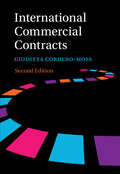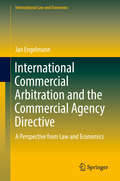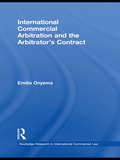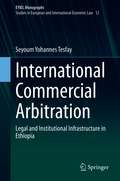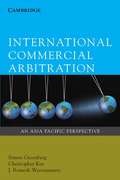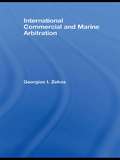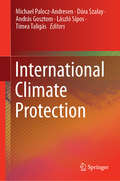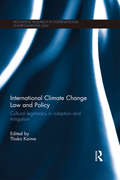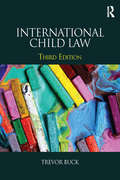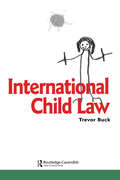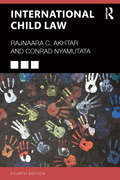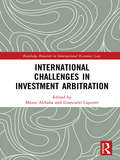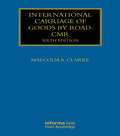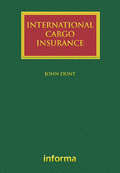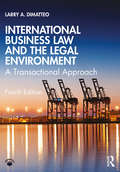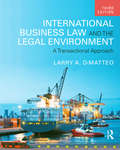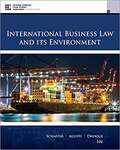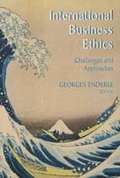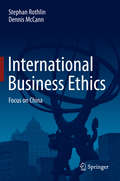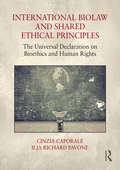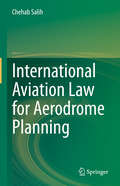- Table View
- List View
International Commercial Contracts
by Giuditta Cordero-MossWith the aim of creating an autonomous regime for the interpretation and application of the contract, boilerplate clauses are often inserted into international commercial contracts without negotiations or regard for their legal effects. The assumption that a sufficiently detailed and clear language will ensure that the legal effects of the contract will only be based on the contract, as opposed to the applicable law, was originally encouraged by English courts, and today most international contracts have these clauses, irrespective of the governing law. This collection of essays demonstrates that this assumption is not fully applicable under systems of civil law, because these systems are based on principles, such as good faith and loyalty, which contradict this approach.
International Commercial Arbitration and the Commercial Agency Directive
by Jan EngelmannThis book investigates the tensions between EU law and international commercial arbitration, i. e. tensions between two phenomena at opposite ends of the public to private ordering continuum. It focuses on the Commercial Agents Directive's regime for indemnity and compensation as one of the most frequent source of these tensions. To mitigate the consequential problems, the book proposes and describes a comprehensive framework for a preferable system of reviewing arbitration agreements and arbitral awards. To this end, it explores the prerequisites of this system through comparative legal analysis of the German, Belgian, French and English systems of review, an assessment of the observable aspects of arbitral practice, game theoretical analysis of the arbitral process, and microeconomic analysis of the cross-border market for commercial agency.
International Commercial Arbitration and the Arbitrator's Contract (Routledge Research in International Commercial Law)
by Emilia OnyemaThis book examines the formation, nature and effect of the arbitrators’ contract, addressing topics such as the appointment, challenge, removal and duties and rights of arbitrators, disputing parties and arbitration institutions. The arguments made in the book are based on a semi-autonomous theory of the juridical nature of international arbitration and a contractual theory of the legal nature of these relationships. From these premises, the book analyses the formation of the arbitrator’s contract in both ad hoc and institutional references. It also examines the institution’s contract with the disputing parties and its effect on the arbitrator’s contract under institutional references. The book draws from national arbitration laws and institutional rules in various jurisdictions to give a global view of the issues examined in it. The arbitrator’s contract is analysed from a global perspective of arbitral law and practice with insights from various jurisdictions in Africa, Asia, Europe, North and South America. The primary focus of the book is an analysis of the formation of the arbitrator’s contract and the terms of this contract and the institution’s contract. The primary question of the consequences (if any) of the breaches of the terms of these contracts and its impact on the exclusion or limitation of liability of arbitrators and institutions is also analysed with the conclusion that since these transactions are contractual and the terms can be categorised as in any normal contract, then normal contractual remedies can be applied to the breaches of these terms. International Commercial Arbitration and the Arbitrator’s Contract will be of great value to arbitration practitioners and researchers in arbitration. It will also be very useful to students of arbitration on the topics of arbitrators and arbitration institution.
International Commercial Arbitration
by Giuditta Cordero-MossArbitration clauses in international commercial contracts are often reused from existing contracts. By so doing, the parties choose to apply, for example, either ad hoc or institutional arbitration and the UNCITRAL, ICC, LCIA, SCC, Swiss or other arbitration rules without necessarily being aware of the consequences. Moreover, parties often assume that an arbitration clause has the effect of excluding any kind of interference from a court of law and of rendering any but the chosen law redundant. This book highlights the specific features of various forms of arbitration and enables lawyers to make informed choices when drafting arbitration clauses. Chapters explain the framework for arbitration, its relationship with national law, and the features of the main arbitration institutions in Europe. The book also highlights new trends in other parts of the world that may have repercussions on the theory of international arbitration.
International Commercial Arbitration: Legal and Institutional Infrastructure in Ethiopia (European Yearbook of International Economic Law #12)
by Seyoum Yohannes TesfayThis book is the first-ever to explore commercial arbitration in the Ethiopian context. Alternative conflict resolution mechanisms are nothing new to the country: arbitration as a dispute settlement mechanism by which a third party issues a binding decision on a dispute between two or more parties by exercising the jurisdictional mandate conferred on it by the parties themselves was established with the adoption of the Civil Code in 1960. This pioneering book evaluates the extent to which Ethiopia’s laws and institutions allow disputing parties to effectively reap the benefits of international commercial arbitration. It interprets the relevant legislation and attempts to bridge the gaps in it, in order to help lawyers, arbitrators, arbitral institutions, academics and judges to understand and apply it. It also helps parties seeking to complete international transactions pertaining to Ethiopia make the right choice regarding conflict resolution.
International Commercial Arbitration
by J. Romesh Weeramantry Simon Greenberg Christopher KeeThere has been an exponential rise in the use of ICA for resolving international business disputes, yet international arbitration is a scarcely regulated, specialty industry. International Commercial Arbitration: An Asia Pacific Perspective is the first book to explain ICA topic by topic with an Asia Pacific focus. Written for students and practising lawyers alike, this authoritative book covers the principles of ICA thoroughly and comparatively. For each issue it utilises academic writings from Asia, Europe and elsewhere, and draws on examples of legislation, arbitration procedural rules and case law from the major Asian jurisdictions. Each principle is explained with a simple statement before proceeding to more technical, theoretical or comparative content. Real-world scenarios are employed to demonstrate actual application to practice. International Commercial Arbitration is an invaluable resource that provides unique insight into real arbitral practice specific to the Asia Pacific region, within a global context.
International Commercial and Marine Arbitration (Routledge Research In International Commercial Law Ser.)
by Georgios I. ZekosInternational Commercial and Marine Arbitration analyses and compares commercial-martime arbitration in a number of different legal systems including the US, the UK, Greece and Belgium. The book examines the role of the courts in arbitration in each of these countries, making reference to the latest case law, and also makes extensive refe
International Climate Protection
by Michael Palocz-Andresen Dóra Szalay András Gosztom László Sípos Tímea TaligásThis book explains the current climate protection processes and technologies, and informs the readers of the limiting factors and opportunities for future development. It represents the highest level of knowledge from leading scientists all over the world. Original high quality figures maximize understanding of the text. The book also introduces a new concept (climatographic), which provides a well pronounced solution to climate protection that is easily understandable for all levels of readers.
International Climate Change Law and Policy: Cultural Legitimacy in Adaptation and Mitigation (Routledge Research in International Environmental Law)
by Thoko KaimeClimate change poses fundamental and varied challenges to all communities across the globe. The adaptation and mitigation strategies proposed by governments and non-governmental organisations are likely to require radical and fundamental shifts in socio-political structures, technological and economic systems, organisational forms, and modes of regulation. The sheer volume of law and policy emanating from the international level makes it uncertain which type of regulatory or policy framework is likely to have a positive impact. The success or failure of proposed measures will depend on their acceptability within the local constituencies within which they are sought to be applied. Therefore there is an urgent need to better comprehend and theorise the role of cultural legitimacy in the choice and effectiveness of international legal and policy interventions aimed at tackling the impact of climate change. The book brings together experts to present perspectives from different disciplines on the issue of international climate change law and policy. Beginning from the premise that legitimacy critiques of international climate change regulation have the capacity to positively influence policy trends and legal choices, the book showcases innovative ideas from across the disciplines and investigate the link between the efficacy of international legal and policy mechanisms on climate change and cultural legitimacy. The book includes chapters on with a theoretical basis as well as specific case-studies from around the globe. The topics covered include: land use planning as a tool of enhancing cultural legitimacy, indigenous peoples in international environmental negotiations, transnational advocacy networks, community-based forestry management and culture and voluntary social movements.
International Child Law
by Trevor BuckInternational Child Law examines and discusses the international legal framework and issues relating to children. Analysing both public and private international legal aspects, this cross-disciplinary text promotes an understanding of the ongoing development of child law, children’s rights and the protection of the child. Examining the theoretical background to the law, and providing a concise and clear overview of the instruments and institutions that protect children internationally, this text then focuses on key themes and issues in child law and children’s rights. This new edition has been updated and revised throughout, including expanded material on the UN Convention on the Rights of the Child, as well as discussion of recent landmark developments on the law relating to recruiting child soldiers as a result of Lubanga (2012). The third edition also includes a new case study feature that critically considers key themes and issues in international child law in a real world context. Drawing on a range of legal and other disciplines, International Child Law is a valuable resource for those in the course of study and research in this area.
International Child Law
by Trevor BuckInternational Child Law examines the international laws for children at both a global and a regional level. In particular the UN Convention on the Rights of the Child is described and critically assessed, while at the regional level the child in Europe is examined and how far the ECHR is engaged as a vehicle to progress childrens rights. Other key issues, increasing regulated by international child law, are spotlighted: child labour, child abduction and inter-country adoption.This book provides the reader with a sound understanding of the international law framework and issues relating to children and is a useful resource to those undertaking advanced study and or research in this area.
International Child Law
by Trevor Buck Alisdair A. Gillespie Lynne Ross Sarah Sargent Rajnaara Akhtar Conrad NyamutataThis book examines the rights of the child using the global framework of the United Nations International Convention on the Rights of the Child 1989. Analysing both public and private international legal aspects, this cross-disciplinary text promotes a holistic understanding of the ongoing development of child law, children’s rights and the protection of the child. In-depth analyses of the following topic areas are included: Childhood in the digital age; Child labour; International parental child abduction; Inter-country adoption; Sexual exploitation; Children and armed conflict; and Indigenous children. These topics are contextualised with further chapters on the concept of childhood and children’s rights, the international legal framework in which the Convention operates and a substantive chapter on the Convention itself. This fourth edition has been updated and revised, including a new chapter dealing with issues arising from childhood in the age of unprecedented digital technological advancements; a crucial issue for childhood experiences in modern times. This edition also includes new case studies, recent legal developments in the field of international child law, and inclusion of broader scholarship to capture diverse views on international law and child law. The aim of this book is to provide the reader with an accessible, informed, critical and scholarly account of the international law framework relating to children. Drawing on a range of legal and other disciplines, this book remains a valuable resource for those in the course of study and research in this area.
International Challenges in Investment Arbitration (Routledge Research in International Economic Law)
by Mesut Akbaba Giancarlo CapurroAs the proverbial workhorse of international economic law, investment arbitration is heavily relied upon around the globe. It has to cope with the demands of increasingly complex proceedings. At the same time, investment arbitration has come under close public scrutiny in the midst of heated political debate. Both of these factors have led to the field of investment protection being subject to continuous changes. Therefore, it presents an abundance of challenges in its interpretation and application. While these challenges are often deeply rooted in the doctrinal foundations of international law, they similarly surface during live arbitral proceedings. International Challenges in Investment Arbitration serves not only as a collection of recently debated issues in investment law; it also deals with the underlying fundamental questions at the intersection of investment arbitration and international law. The book is the product of the 1st Bucerius Law Journal Conference on International Investment Law & Arbitration. It combines the current state of knowledge, new perspectives on the topic as well as practical issues and will be of interest to researchers, academics and practitioners in the fields of international investment law, international economic law, regulation and comparative law.
International Carriage of Goods by Road: Cmr (Maritime and Transport Law Library)
by Malcolm A. ClarkeNow in its sixth edition, this key text provides a comprehensive analysis of the international carriage of goods by road under the provisions of the CMR Convention. The author offers unparalleled coverage of both English and European case law in a text that is praised for its accessible, user-friendly style. This new edition is fully updated with the very latest in case law both internationally and on a domestic level, including: New developments on the applicability of the CMR to multimodal transport, as per the Godafoss case The concept of the "wilful misconduct" in failure to guard the vehicle Thorough analysis of TNT Express Nederland BV v AXA Versicherung AG It also provides new coverage of the impact of e-commerce on road haulage. This book is an invaluable reference tool for transport practitioners with an international and domestic client base. It is also a useful guide for academics and students of the carriage of goods by road.
International Cargo Insurance (Lloyd's Shipping Law Library)
by John DuntInternational Cargo Insurance examines the law and practice of marine cargo insurance on a worldwide basis, and provides the busy practitioner the information needed to quickly and accurately resolve cargo insurance coverage issues, wherever they may arise. The book concentrates on the law in the United States and England. It then examines other countries with a common law tradition including Hong Kong, Singapore, Japan and Australia. The civil law systems are highlighted in a number of key trading nations: Italy, Germany, France and Norway. The book includes chapters on South Africa as well as the People’s Republic of China. It concludes with a comparative law chapter concentrating on issues that arise in practice in cargo coverage cases. This chapter also examines how the Institute Cargo Clauses have been construed by Courts worldwide. The appendices include the standard cargo policy insurance terms used in each jurisdiction, some translated for the first time for this volume, as well as translations of the relevant statutes and commercial codes, many not available elsewhere.
International Business Law and the Legal Environment: A Transactional Approach
by Larry A. DiMatteoThe fourth edition of International Business Law and the Legal Environment: A Transactional Approach gives business and law students a clear understanding of the legal principles that govern international business. This book goes beyond compliance by emphasizing how to use the law to create value and competitive advantage. DiMatteo’s transactional approach walks students through key business transactions—from import and export, contracts, and finance to countertrade, dispute resolution, licensing, and more—giving them both context and providing real-world applications. More concise than previous editions, this new edition also features: • Added coverage of new technologies, such as smart contracts, digital platforms, and blockchain technology • Discussion of businesses and sustainability, climate change, and creating a circular economy • Greater focus on UNIDROIT Principles and a review of INCOTERMS 2020 • Expansion of common carrier coverage to include CMI trucking and CMR railway conventions • International perspective and use of a variety of national and international law materials • Great coverage of EU substantive law Upper-level undergraduate and postgraduate students of business law and international business will appreciate DiMatteo’s lucid writing style, and professionals will find this book to be a comprehensive resource. Online resources include an instructor’s manual, PowerPoint slides, test bank, and other tools to provide additional support for students and instructors.
International Business Law and the Legal Environment: A Transactional Approach
by Larry A. DimatteoInternational Business Law and the Legal Environment provides business students with a strong understanding of the legal principles that govern doing business internationally. Not merely about compliance, this book emphasizes how to use the law to create value and competitive advantage. DiMatteo’s transactional approach walks students through key business transactions—from import and export, contracts, and finance to countertrade, dispute resolution, licensing, and more—giving them both context and demonstrating real world application. This new edition also includes: New material on comparative contract and sales law & European private law; joint ventures and collaborative alliances. A new part on foreign direct investment that includes a chapter on emerging markets. New chapters on privacy law, and on environmental concerns. Greater coverage of the World Trade Organization. "Case highlights" and court opinions that feature edited court transcripts which expose students to actual legal reasoning and an understanding of the underlying legal principles. These decisions are drawn from a broad range of countries, offering a truly international look at the subject. Students of business law and international business courses will find DiMatteo’s clear writing style easy to follow. A companion web site includes an instructor’s manual, PowerPoints, and other tools to provide additional support for students and instructors.
International Business Law and Its Environment: Tenth Edition (Mindtap Course List Series)
by Richard Schaffer Filiberto Agusti Lucien Dhooge<p>Today, no business is purely domestic. Even the smallest local firms are affected by global competition and world events. INTERNATIONAL BUSINESS LAW AND ITS ENVIRONMENT, 10E delivers complete, reader-friendly coverage of the legal implications and ramifications of doing business internationally. You examine the cultural, political, economic, and ethical issues today's global business managers face. With a focus on trade, the licensing of intellectual property, and foreign direct investment, you examine the three major forms of doing business in a foreign country. Real examples, precedent-setting cases, managerial implications, and ethical considerations show how to apply key principles. From the legal relationship between parties in an international business transaction to managing risk to the special challenges of conducting business in emerging economies, this edition helps you understand the most common practices and critical issues in global business law.</p>
International Business Ethics: Challenges and Approaches
by Georges Enderle<P>International Business Ethics: Challenges and Approaches, edited by Georges Enderle, is a pioneer in this widely uncharted field of international business ethics. <P>This volume includes the work of 39 contributors, half of them from non-Western countries, first presented at the First World Congress of Business, Economics, and Ethics hosted by Reitaku University and the Institute of Moralogy in Japan. <P>Together, their articles paint an extraordinarily rich multidisciplinary picture of international business ethics as it evolves, and delineate the contours of how international business ethics may develop at the turn of the millennium.
International Business Ethics
by Stephan Rothlin Dennis MccannThis book addresses an essential need felt by many who seek to promote best business practices in China and East Asia - namely the need for culturally appropriate instructional materials (basic information, case studies and ethical perspectives) that will allow managers and entrepreneurs to understand and embrace the challenge of moral leadership in business. In an era characterized by globalization and the increasing importance of the economies of China, India, Japan and SE Asia, international business ethics must reflect the concerns of the people living and working in this area, the moral and spiritual traditions that have nurtured them and their specific contributions to sustainable development. This book presents twenty important case studies, taken from newsworthy events of the past few years, in which Asians and others have attempted to respond to this challenge. Each case study has been selected and shaped in order to highlight various aspects of doing business in Asia, starting with basic principles and moving on to the specific responsibilities that businesses have towards their various stakeholders. The authors contend that the best way to appreciate the relevance of Asian moral and spiritual traditions is to determine their specific contribution to virtue ethics, where the ancient traditions of both East and West converge in their focus on the qualities of moral leadership that form the basis of best business practice. Exploring the case studies will enable readers to appreciate the continued relevance of these ethical perspectives in Asian business. Best business practice clearly involves learning to do business and playing the game according to the rules; but the necessity of playing by the rules is not likely to become clear until one takes up the path that leads to a virtuous life in business, developing a moral character chiefly based on integrity.
International Business and Global Climate Change
by Jonatan Pinkse Ans KolkClimate change has become an important topic on the business agenda with strong pressure being placed on companies to respond and contribute to finding solutions to this urgent problem. This text provides a comprehensive analysis of international business responses to global climate change and climate change policy. Embedded in relevant management literature, this book gives a concise treatment of developments in policy and business activity on global, regional and national levels, using examples and systematic data from a large number of international companies. The first part outlines the international climate policy landscape and voluntary initiatives taken by companies, both alone and together with others. The second part examines companies’ strategies, covering innovation for climate change, as well as compensation via emissions trading and carbon offsetting. Written by well-known experts in the field, International Business and Global Climate Change illustrates how an environmental topic becomes strategically important in a mainstream sense, affecting corporate decision-making, business processes, products, reputation, advertising, communication, accounting and finance. This is a must-read for academics as well as practitioners concerned with this issue.
International Biolaw and Shared Ethical Principles: The Universal Declaration on Bioethics and Human Rights
by Cinzia Caporale and Ilja Richard PavoneThe Universal Declaration on Bioethics and Human Rights, 2005, marked a significant step towards the recognition of universal standards in the field of science and medicine. This book provides an overview of the ethical and legal developments which have occurred in the field of bioethics and human rights since then. The work critically analyzes the Declaration from an ethical and legal perspective, commenting on its implementation, and discussing the role of non-binding norms in international bioethics. The authors examine whether the Declaration has contributed to the understanding of universal or global bioethics, and to what degree states have implemented the principles in their domestic legislation. The volume explores the currency of the Declaration vis-à-vis the more recent developments in technology and medicine and looks ahead to envisage the major bioethical challenges of the next twenty years. In this context, the book offers a comprehensive ethical and legal study of the Declaration with an in-depth analysis of the meaning of the provisions, in order to clarify the extension of human rights in the field of medicine and the obligations incumbent upon UNESCO member States, with reference to their implementation practice.
International Bankruptcy: The Challenge of Insolvency in a Global Economy
by Jodie Adams KirshnerWith the growth of international business and the rise of companies with subsidiaries around the world, the question of where a company should file bankruptcy proceedings has become increasingly complicated. Today, most businesses are likely to have international trading partners, or to operate and hold assets in more than one country. To execute a corporate restructuring or liquidation under several different insolvency regimes at once is an enormous and expensive challenge. With International Bankruptcy, Jodie Adams Kirshner explores the issues involved in determining which courts should have jurisdiction and which laws should apply in addressing problems within. Kirshner brings together theory with the discussion of specific cases and legal developments to explore this developing area of law. Looking at the key issues that arise in cross-border proceedings, International Bankruptcy offers a guide to this legal environment. In addition, she explores how globalization has encouraged the creation of new legal practices that bypass national legal systems, such as the European Insolvency Framework and the Model Law on Cross-Border Insolvency of the United Nations Commission on International Trade Law. The traditional comparative law framework misses the nuances of these dynamics. Ultimately, Kirshner draws both positive and negative lessons about regulatory coordination in the hope of finding cleaner and more productive paths to wind down or rehabilitate failing international companies.
International Aviation Law for Aerodrome Planning
by Chehab SalihThe objective of this book is to provide ICAO, States, competent authorities and aerodrome operators with a comprehensive overview of legal challenges related to international aerodrome planning. Answers to derived legal questions as well as recommendations thereafter shall help to enhance regulatory systems and to establish a safer aerodrome environment worldwide. Compliant aerodrome planning has an immense impact on the safety of passengers, personnel, aircraft – and of course the airport. Achieving a high safety standard is crucial, as many incidents and accidents in aviation happen at or in the vicinity of airports. Currently, more than 40% of the ICAO Member States do not fully comply with international legal requirements for aerodrome planning. Representatives of ICAO and States, as well as aerodrome and authority personnel, will understand why compliance with the different legal facets of aerodrome planning is challenging and learn how shortcomings can be solved.
